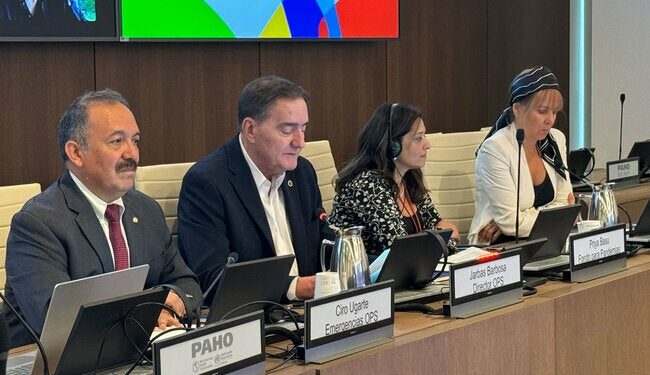Washington, D.C., July 1, 2024 – The Pan American Health Organization (PAHO) and the World Bank today launched the PROTECT Project, an initiative to improve pandemic response in seven South American countries. The initiative, funded by a grant from The Pandemic Fund of almost US$17 million, will focus on optimizing surveillance and laboratory systems in border regions of Bolivia, Brazil, Chile, Colombia, Ecuador, Paraguay, and Uruguay.
The PROTECT Project, presented at the PAHO headquarters in Washington, D.C., aims to improve the early detection, characterization, and response to emerging zoonotic diseases that can trigger a pandemic and will focus on rural and remote communities in the Amazon Basin. These areas face unique challenges, including a biodiversity with high potential for the emergence of pathogens that can drive epidemics or pandemics, such as animal reservoirs or vectors of diseases.
“PROTECT represents a crucial step towards more robust preparedness for epidemic and pandemic threats in the Amazon Basin,” PAHO Director Jarbas Barbosa said. “By strengthening capacity to detect pathogens with epidemic potential and implementing surveillance and early warning systems for emerging and re-emerging diseases, we will be protecting vulnerable communities in border areas and reducing the impact of future pandemics in the Americas.”
Engaging a diverse coalition, PROTECT brings together Ministries of Health and Agriculture, PAHO/WHO, the World Bank, and PAHO’s Pan American Foot and Mouth Disease and Veterinary Public Health Center (PANAFTOSA).
“We welcome this joint collaboration. At the World Bank, we are committed to offering our experience, knowledge, and support to strengthen the One Health approach in Latin America and the Caribbean, and to prevent pandemics like COVID-19 from taking us by surprise again,” said Jaime Saavedra, Human Development Director for Latin America and the Caribbean at the World Bank. “There is an urgent need for political commitment from governments and better coordination between all sectors to save lives together,” he added.
Over the next three years, PROTECT is expected to benefit more than 2.4 million people, including indigenous, non-indigenous, and riverside communities. Activities will focus on strengthening early warning surveillance, modernizing and increasing the efficiency of laboratories, and promoting regional coordination for a more effective and collaborative pandemic response.
“The Pandemic Fund’s PROTECT project marks a major milestone in our collective efforts to promote global health security”, said Priya Basu, Executive Head of the Pandemic Fund. “The investments focus on building integrated early warning and surveillance systems for zoonotic diseases, laboratories, and a fit for purpose workforce, through a One Health approach. Furthermore, the project is galvanizing cooperation and coordination among sectors, partners, and countries. I want to thank our partners for their commitment, and I look forward to the results.”
The One Health approach focuses on the interconnections between human health, animal health, and the environment. One Health allows for comprehensive and sustainable activities to address public health threats.
The launch event for the initiative was attended virtually by representatives from the Ministries of Health, Agriculture, and Environment from the seven countries involved, as well as the PANAFTOSA team.
About the Pandemic Fund
The Pandemic Fund, established in 2022 and formally launched in November 2023, is the first multilateral funding mechanism dedicated to providing multi-year grants to help low- and middle-income countries be better prepared for future pandemics. In its first round of funding allocations, The Fund approved grants for 37 countries across the globe.
Source link : https://www.paho.org/en/news/1-7-2024-paho-and-world-bank-launch-protect-project-strengthen-pandemic-response-south
Author :
Publish date : 2024-07-01 12:24:15
Copyright for syndicated content belongs to the linked Source.











